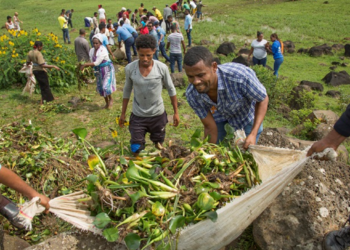The WestMED countries are recommitting themselves to developing a sustainable, resilient, low-carbon and circular blue economy for the Western Mediterranean – On 23 June 2023, ministers and high-level representatives from the 10 WestMED countries (Algeria, France, Italy, Libya, Malta, Mauritania, Morocco, Portugal, Spain and Tunisia) met in Malta with representatives from the European Commission and the Union for the Mediterranean to reassess and update the priorities set out in the WestMED Framework for Action, as supported by the WestMED initiative.
This follows country reports and the European Commission’s report evaluating the implementation of the WestMED initiative to date, one of the main recommendations of which is to “reconfirm and streamline priorities”.
These priorities focus on addressing the common challenges of the Mediterranean Basin and translate into a shared commitment to pursue the development of a sustainable, resilient, low-carbon and circular blue economy, to fight climate change, to adapt to its effects and to reverse the loss of marine biodiversity.
This is the 3rd WestMED Ministerial Declaration, the first having been drafted in Naples in 2017, inviting WestMED countries to explore the added value and feasibility of appropriate maritime strategies, including at sub-regional level, and to build on existing multilateral processes such as the 5+5 Dialogue and the relevant UfM Ministerial Declarations.
On 4 December 2018, the countries adopted the 2nd WestMED Ministerial Declaration in Algiers, approving the governance and management structure for the implementation of the initiative for the sustainable development of the blue economy in the Western Mediterranean (including the creation of the WestMED assistance mechanism) and the roadmap which included 6 priorities.
Four years later, with this new 2023 declaration, the countries have renewed and adjusted their commitments to the following priorities:
- Sustainable production and consumption, in particular by supporting the transition of maritime transport, green shipping and ports towards carbon neutrality and zero emissions, and by making ports energy hubs; innovative and restorative aquaculture and fisheries; coastal and maritime eco-tourism;
- Maritime clusters;
- Blue skills and jobs;
- Ocean education and youth;
- Promotion of Maritime Spatial Planning (MSP);
- Decarbonising blue economy sectors and stimulating marine renewable energies;
- Stepping up efforts to combat air and marine pollution;
- Strengthening the ambition to preserve marine and coastal biodiversity in the Mediterranean;
- Promoting training and technology transfer;
- Developing solutions for coastal resilience and early warning systems;
- Maritime safety and surveillance as a prerequisite for a prosperous and sustainable blue economy in the Mediterranean.
The declaration represents a renewed political commitment to the sustainable management of the Mediterranean, in parallel with efforts to emerge from the Covid-19 crisis, while addressing the serious impacts of climate change and environmental degradation, and strengthening regional cooperation in the MRU region on a sustainable blue economy.
With this declaration, the countries also recognise the work carried out so far under the WestMED initiative and stress the need to create synergies with other sea basin strategies (the Atlantic strategy and the Common Maritime Agenda for the Black Sea).
They welcome this new common sea-basin approach for coordinated technical assistance which started at the end of 2022.
This new EU sea-basin approach not only addresses the needs of each individual sea-basin, but also enables the exchange of best practice and the organisation of national and regional events on topics of clear relevance to all basins, such as blue skills, blue investments, green shipping and sustainable aquaculture.
The WestMED 2023 Declaration is fully in line with the 2nd UfM Ministerial Declaration on the Sustainable Blue Economy adopted on 2 February 2021 and its roadmap for implementation. It is also fully aligned with the European Commission’s Communication on a sustainable approach to the blue economy in the EU, published in May 2021, which addresses the issue of a transition from “blue growth” to a “sustainable blue economy”.
Mr Aaron Farrugia (Malta – Minister for Transport Infrastructure and Investment Projects) and Mr Mohamed Ould Abidine Ould Maayif (Mauritania – Minister for Fisheries and the Maritime Economy) opened the ministerial conference as co-chairs of the WestMED initiative.
Their opening speeches were followed by Charlena Vitcheva (European Commission – Director General of the Directorate General for Maritime Affairs and Fisheries – DG MARE) and Almotaz Abadi (Union for the Mediterranean – Deputy Secretary General for Water, Environment and the Blue Economy).
The WestMED countries are recommitting themselves to developing a sustainable, resilient, low-carbon and circular blue economy for the Western Mediterranean.









